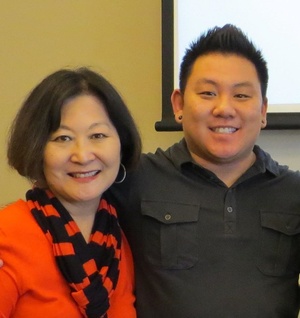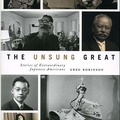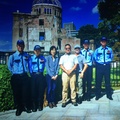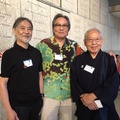According to UCLA’s Williams Institute, 46% of transgender males attempt suicide, says educator, author, and lesbian/gay/bisexual/transgender (LGBT) community advocate Marsha Aizumi.
“My son was one of those individuals who thought about suicide, but did not attempt it,” she notes. “Aiden seemed to have enough resilience to keep living and for that I am so grateful. I think that is one of the reasons I work so hard for this cause.”
For Aizumi, the cause is to fight prejudices faced by LGBT individuals.
As a Japanese American, Aizumi found that her personal journey from fearful parent to public activist was difficult in part because of her ethnic heritage.
“(At first) I don't think I really gave much thought about my Japanese cultural upbringing,” Aizumi recalls. “It was just a part of my life: koden at funerals, New Year’s Day celebrations, respect and honor to elders were things that were part of my life.”
“But I had one relative, a grey-haired, straight-back-postured, proud man, who always said that we can never dishonor our family name, because it went back to samurai times and had so much honor attached to it,” Aizumi recalls. “Before her gender change, when my daughter came out as lesbian, I heard that voice in my head and felt so much shame. How could I have brought such dishonor to my family? For months I could not say the word ‘lesbian’ and any time I thought about my child being lesbian, I heard this relative's voice in my head.”
Aizumi became concerned about hostilities and bullying faced by LGBT youths and turned to PFLAG, a national organization that supports, educates, and advocates for LGBT families, for help. “I was in so much fear for the safety of my child. I didn't know where else I could turn to for support.”
“The first person who made an indelible impact was a young Caucasian gay man who was at the very first PFLAG meeting I attended,” says Aizumi. “As I was a scared and devastated mother, he told me that I was entering a community that would nurture and love me, my son, and my family. There was a monthly support group meeting that I attended, so I could ask questions in a safe environment with people who had traveled this path successfully. I heard others share their stories, both of pain and hope.”
“Each story of pain gave me comfort that I was not alone on this journey,” Aizumi says. “And each story of triumph gave me hope that one day I could feel less fear, sadness, and shame and more acceptance and love for the situation I was in.”
Later, after noticing the positive effects on her family, Aizumi more actively educated herself by going to workshops or events that would help her to understand how to better support her child. “Finally one day, I woke up and realized I had become an advocate not only for my son, but for all LGBTQ individuals. I absolutely fell in love with the LGBTQ community, because of their vulnerability, their compassion and their vision for a better world for our children.”
Aizumi’s thoughts returned to her Japanese American elders, but with a new perspective. “Somewhere along the way, I recognized that family was part of honor,” says Aizumi. “So by the time Aiden transitioned to male, that voice (of guilt and shame) no longer became part of the dialogue that I heard in my head. And I realized that standing by my child was a way to honor what family truly meant.”
Another aspect of Nikkei culture that Aizumi reconciled with her newfound activism was the traditional aversion to conflict and rebellion. “Through this journey I learned that my voice makes a difference and it didn't have to be loud, brash, or disrespectful,” Aizumi explains. “I have found that I am most effective when I am exactly who I am and do not try to be someone different. I think I learned this from Aiden. I thought activists had to be a certain way, but I have come to realize that bringing my best self to the moment is how I can be most effective.”
“In 2011, I was elected to the PFLAG National Board of Directors,” says Aizumi. “In this role, I am currently focusing on bringing greater awareness, and resources to the API (Asian Pacific Islander) community. I am also working with the Japanese American Citizens League (JACL) to do this work, both on a local and national level. I am also working with various cities to bring a number of organizations and individuals together to do this work as well for the API community.”
The following year, Aizumi published a book about her experiences, entitled Two Spirits, One Heart: A Mother, Her Transgender Son, and Their Journey to Love and Acceptance. Her son co-wrote the book with her.
Part of Aizumi’s advocacy is resulting in “Okaeri: A Nikkei LGBTQ Gathering,” a community event to be held at the Japanese American National Museum in Los Angeles on November 14 and 15, 2014.
“The vision for Okaeri originally got started because I met with Bill Watanabe, retired executive director of the Little Tokyo Service Center last year,” Aizumi recounts. “I wanted to do something that focused on the Nikkei community and I asked him if he would have coffee with me to talk about what this could look like. Bill asked me if there has ever been a LGBT conference for the Nikkei community and I told him that I did not believe so. He said that he thought this could be something very historic and groundbreaking and if I wanted to do something like this, he would support me.”
With Watanabe’s support, Aizumi rallied a group of fellow supporters, including the Museum and Asian Americans Advancing Justice-Los Angeles, JACL, faith-based individuals, and found a co-chair, RiKu Matsuda. The event focuses on the Nikkei community but is open to anyone interested in attending.
“Aiden and I will be opening up the event and also doing a workshop with my husband and younger son also involved in the Q & A portion of the workshop,” says Aizumi. “I am thrilled at the progress and the interest we are getting from local organizations and cities such as San Diego, Seattle, and the Northern California.”
While the response looks encouraging in the near future, Aizumi is committed to her cause for the long term.
“Fear can drive a society to forget about the humanity we all share,” Aizumi notes. “It happened in World War II when the United States put so many Japanese American families into internment camps. And it is happening all around the United States and the world to LGBTQ individuals and their families. Fear can be overcome with knowledge and reaching out for support, so I want to thank Discover Nikkei for allowing me to share my thoughts to bring greater knowledge to the Nikkei community.”
[Editor’s Note: Aizumi welcomes anyone in need of support to contact her directly via e-mail.]
* * * * *
Okaeri: A Nikkei LGBTQ Gathering
Japanese American National Museum
Los Angeles, CA
November 14–15, 2014
Okaeri is a day of educational and storytelling workshops for LGBTQ members of the Nikkei community and their friends, family, and allies. All are welcome to come and share support and resources as we work to build an inclusive Nikkei community.
For more information about Okaeri: A Nikkei LGBTQ Gathering >>
© 2014 Darryl Mori






